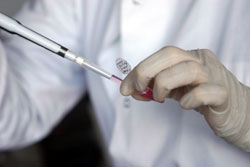Overcoming tumour resistance
The EC-funded IMPALED project studied the molecular interactions of the p53 family of proteins, the major sensor of DNA damage in the cells, with the mitochondria. Sensing DNA damage is the first step towards the initiation of a cascade of events leading the cell to apoptosis, rather than uncontrollable cancer growth. The project aimed to elucidate the mechanisms that lead to tumour resistance with the ultimate goal of developing methodologies that could reverse the situation. Project partners EIRX Therapeutics focused their efforts on the study of the role played by the cytochrome P450 (Cyp450) group of enzymes on the metabolism of anticancer drugs. It has been shown that their enzymatic activity can enhance or impede the overall effect of anticancer regimens. Researchers studied the expression pattern of a number of Cyp450 family members in a series of lung cancer cell lines. Given their function in a number of key metabolic steps, the goal was to establish whether Cyp450 expression was somehow linked to tumour resistance. Further studies are likely to be instrumental in the identification of specific molecular targets for the reversal of tumour resistance in lung cancer.







